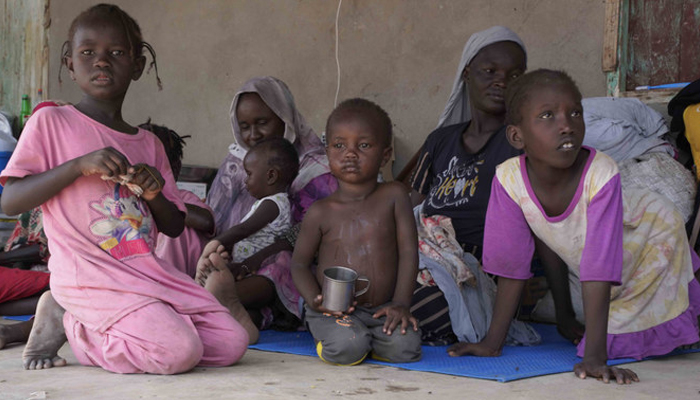Forgotten Sudan
Centre of conflict is land ownership and control to allow influential countries and governments to pocket its rich natural resources
While violence in Sudan may not make it to news headlines on a daily basis, the residents of this war-affected country continue to face grave dangers. Now a recent report by Unicef predicts a harrowing future: around 700,000 children in Sudan are at risk of suffering the deadliest form of malnutrition this year. A report by Doctors Without Borders suggests that at least one child dies every two hours in a refugee camp in Sudan’s North Darfur state. The country is in the middle of a war between its armed forces and the paramilitary Rapid Support Forces (RSF), which is backed by some foreign countries. The centre of conflict is land ownership and control to allow influential countries and governments to pocket its rich natural resources. But this insatiable greed for accumulating resources has made the players of the conflict completely blind to the suffering of hundreds of thousands of children. The 10-month-long war in the country has obliterated its civilian infrastructure, displacing millions and leading to famine conditions.
Unicef has appealed for $840 million to help ease the suffering of some 7.5 million children in Sudan, but officials have said they are failing to raise the required amount. This could be attributed to the indifference of Western governments which have shown in words and action that they are not gushy about extending humanitarian aid to victims that do not meet their definition of a perfect victim. While foreign governments are quick to send military aid to Ukraine and a settler-colonial state in the Middle East, they have turned their back on the vulnerable in the MENA region. Also, at a time when the cost of living is at an all-time high in developed countries, the government’s indifference to people in need of humanitarian aid has not garnered much outrage.
It is indeed shameful to witness that all the ideals that Western governments used to espouse in the past were nothing but meaningless words. Over the past few months, these rich nations have shown that crises in the Global South are not worthy of their “thoughts and prayers”. And this indifference is not limited to armed conflicts, we have seen how victims of climate-induced catastrophes remained ignored by the rich nations which are responsible for causing these disasters in the first place. Countries in the Global South need to make strong forums and organizations, independent of influence from the West and its allies, to extend help and aid to developing countries in this highly ignored region. While Western leaders conduct academic sessions on violence against women and children during armed conflict, they simultaneously observe criminal silence on catastrophes that are the doing of their allies or their own.
-
 Leonardo DiCaprio's Co-star Reflects On His Viral Moment At Golden Globes
Leonardo DiCaprio's Co-star Reflects On His Viral Moment At Golden Globes -
 SpaceX Pivots From Mars Plans To Prioritize 2027 Moon Landing
SpaceX Pivots From Mars Plans To Prioritize 2027 Moon Landing -
 J. Cole Brings Back Old-school CD Sales For 'The Fall-Off' Release
J. Cole Brings Back Old-school CD Sales For 'The Fall-Off' Release -
 King Charles Still Cares About Meghan Markle
King Charles Still Cares About Meghan Markle -
 GTA 6 Built By Hand, Street By Street, Rockstar Confirms Ahead Of Launch
GTA 6 Built By Hand, Street By Street, Rockstar Confirms Ahead Of Launch -
 Funeral Home Owner Sentenced To 40 Years For Selling Corpses, Faking Ashes
Funeral Home Owner Sentenced To 40 Years For Selling Corpses, Faking Ashes -
 Why Is Thor Portrayed Differently In Marvel Movies?
Why Is Thor Portrayed Differently In Marvel Movies? -
 Dutch Seismologist Hints At 'surprise’ Quake In Coming Days
Dutch Seismologist Hints At 'surprise’ Quake In Coming Days -
 Australia’s Liberal-National Coalition Reunites After Brief Split Over Hate Laws
Australia’s Liberal-National Coalition Reunites After Brief Split Over Hate Laws -
 DC Director Gives Hopeful Message As Questions Raised Over 'Blue Beetle's Future
DC Director Gives Hopeful Message As Questions Raised Over 'Blue Beetle's Future -
 King Charles New Plans For Andrew In Norfolk Exposed
King Charles New Plans For Andrew In Norfolk Exposed -
 What You Need To Know About Ischemic Stroke
What You Need To Know About Ischemic Stroke -
 Shocking Reason Behind Type 2 Diabetes Revealed By Scientists
Shocking Reason Behind Type 2 Diabetes Revealed By Scientists -
 SpaceX Cleared For NASA Crew-12 Launch After Falcon 9 Review
SpaceX Cleared For NASA Crew-12 Launch After Falcon 9 Review -
 Meghan Markle Gives Old Hollywood Vibes In New Photos At Glitzy Event
Meghan Markle Gives Old Hollywood Vibes In New Photos At Glitzy Event -
 Simple 'finger Test' Unveils Lung Cancer Diagnosis
Simple 'finger Test' Unveils Lung Cancer Diagnosis




